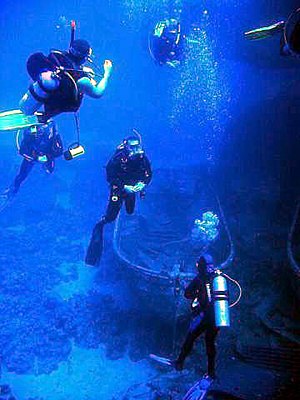 Scuba diving is traditionally a look, don't touch kind of sport. But even careful divers can inadvertently run into trouble. By far the most common diving injury is the common scrape, usually from coral.
Scuba diving is traditionally a look, don't touch kind of sport. But even careful divers can inadvertently run into trouble. By far the most common diving injury is the common scrape, usually from coral.Irritations often occur as a result of a brush with coral or sponges. Coral scrapes can be painful and sometimes difficult to heal because the living organisms in the coral can get into the wound and cause infections. Contact with a sponge can leave irritating fibers in the skin, producing an itching rash that can range from mild to severe, possibly with pain and blistering.
Even if you're careful, it's likely you'll come into contact with coral someday. If and when, here's what to do:
1. An ounce of prevention is worth a pound of cure. Makes sure your body is covered, even if just by a dive skin, and wear gloves where allowed.
2. Regularly irrigate a scrape with copious amounts of vinegar over a period of about 30 minutes.
3. Apply triple-antibiotic to the wound twice a day for a couple of days.
4. Scrapes can become infected even with proper initial care. Watch for hotness to the touch, redness or red streaks around the site, swelling, discharge of pus, or fever. If you see them, contact a doctor.
5. Fragments of coral sometimes become lodged beneath the skin and the body mounts a prolonged allergic reaction to them. In some cases, debridement is required to resolve the reaction.
Even in the absence of embedded coral remnants, it is not unusual for a marked hypersensitivity response to a coral injury to continue for three to four weeks before significantly improving. Sometimes the lesion will resolve, then return.
If a scrape doesn't substantially resolve within a month, or gets worse, you should consult a dermatologist.
Editor's Note: Even innocent injuries can turn deadly if you have an allergic or severe reaction. After any accident, watch for severe swelling, dizziness, blurred vision, breathing difficulties, weakness, muscle pain, cold sweat and a rapid heartbeat. If any occur, call 911 (or DAN's emergency hotline 919-684-4DAN if no emergency services are available) immediately. Injectible epinephrine can help calm allergic reactions. CPR may be necessary until help arrives.
Thanks to Doc Vikingo has been scuba certified for more than 35 years and has dived all over the world. He is a practising doctor in the Baltimore/Washington D.C. area and has held faculty positions at several major hospitals, including Johns Hopkins. With an interest in diving medicine, he serves as administrator at Scuba Clinic Online.
Kathy Dowsett
www.kirkscubagear.com







